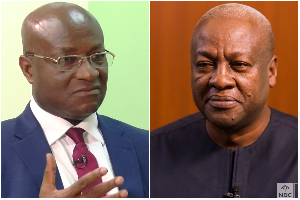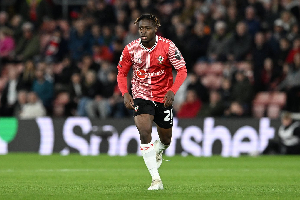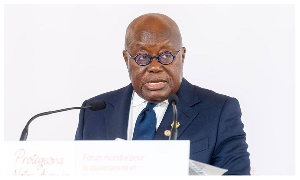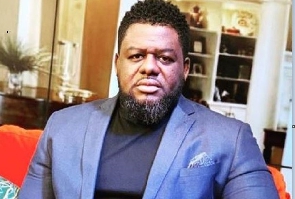By: Kobina Antobam
It was Kennedy Adjapong, who, during the last election campaign, made it very clear and translated for Ghanaians what was meant by “All-Die-Be-Die,” when he blurted out angrily his threat of surgical genocide of Gas and Ewes by his Akan subset, the Asantes. But, remember, Ghanaians, that Adjapong’s threat of ethnic carnage did not come from the Fantses, of which I am one, who are also Akans.
Mr. Adjapong terrified the whole country and prompted Ghana’s intelligence agency to invite him in for questioning. He deservingly received very serious nationwide rebuke for his carelessness and foolishness. I still believe that Mr. Adjapong should have been hit with a parliamentary dismissal or a strong censure, a huge fine, and/or imprisonment for threatening to cause bloody mayhem across the country.
Prior to Mr. Adjapong’s dangerous public nuisance, Mr. Addo Dankwa Akufo-Addo, the presidential candidate of the New Patriotic Party, imprudently uttered the now famous phrases, “we Akans” and “all-die-be-die.” Not unlike Kennedy Adjapong, Mr. Akufo-Addo also startled many Ghanaians with those sensitive pronouncements and made many Ghanaians stand up and examine the seriousness and implications of those statements as well as the speaker himself.
In spite of his past missteps, I still have a soft spot somewhere in my heart for the man, Akufo-Addo. He comes across as a decent man, but the man unfortunately did set himself up for an unceasing abuse, ridicule, and revilement which unfortunately clouded the glowing impressions Ghanaians had of him and eventually doomed his presidential prospects. Any and all cogent practicable national policy changes and solutions he proposed were bluntly eclipsed by loud criticisms, unanswered rumors, serious vituperations, and intentional distractions by the opposing party members who smelled blood and pounced; a few of the charges were unfounded, but did dent his national approval all the same.
I am one of the many Ghanaians who were really frightened then about the threat of a nationwide insecurity and came down hard on those two personalities. But, this time, I would like to disagree with those who have revived their political attacks on Akufo-Addo by asking that he publicly apologize for those two phrases. I take a stand, in these critical times when Ghana is experiencing dire political and economic growing pains, that the election campaign this time should be less about personality deficiencies, personal ridicule and more about policy differences and finding solutions for the ongoing intractable economic downturn and the many social issues dogging the country.
Again, I do not believe Akufo-Addo needs to prostrate before Ghanaians with a bullhorn in hand and loudly apologize to the nation. He has already been there and done that. With careful choice of words, he has already eaten his combative bombastic emotive words of recent past. He has told Ghanaians how sorry he was about his careless choice of words.
In March this year, when he announced that he was going to contest the candidacy of the NPP for president, he used that opportunity to tell Ghanaians that he was truly sorry. “I have made mistakes in my life, I have said things I could on hindsight have put better,” he said. In order for him to project a dignified image and be a serious contender of the upcoming presidential elections, I consider this a decent enough contrition and acceptance of guilt. So, I will admonish partisan Ghanaians with thick blinders on not be petty, mischievous, and crass and stop asking Mr. Akufo-Addo to publicly apologize to his fellow citizens for those two comments.
I also understand that, as long as ethno-centered insults continue to be directed at President John Mahama, it is useless for me to ask members of National Democratic Congress and other Ghanaians who oppose the NPP and who are hell-bent on hurling debasing ethnic taunts to hold back all unwarranted personal attacks directed at Mr. Akufo-Addo. I am also aware that stubborn Ghanaian bullies on both sides of the aisle will ignore my plea and continue with the insults because that’s what sustains them.
We should rather turn our attention to the dramatic transformations now taking place in the party and how serious and substantive the changes are. The need for a closer look at the party, NPP, is critical in the sense that, being the largest opposition party, there is an excellent chance of them returning to power, if not after the next elections but sometime in the future.
An appropriate question to ask now is that, is there a concrete improvement afoot in the party? I believe that there is a transformation taking place now but I have my doubts about the solidity and seriousness of these changes. We have all noticed lately that the party has embarked on a gradual shift away from the past braggadocio, belligerence and chest-thumping of the diehard stalwarts, especially Akufo-Addo, Adjapong, and other prominent members.
Taking cues from his near confrontation with the Ghana Supreme Court and the heavy nationwide criticisms for his ethnic cleansing threats, Kennedy Adjapong is a little calmer and quieter these days. In addition, leading up to last month’s officers’ convention in Tamale, Akufo-Addo repeatedly admonished both the party’s grassroots and hierarchy not to attract undue criticisms and “negative publicity” by being positive and attractive to sections of the Ghanaian community who have traditionally distanced themselves from the NPP over the years. He has been seen and heard repeatedly extolling peace and tranquility and discretion within the party and especially in dealing with the opposition.
However, despite all those efforts, it is still necessary to point out that, it was Mr. Akufo-Addo, as a leader of the second largest party in the country, who popularized it by heralding the expression, “We Akans,” and brought that and “all-die-be-die” straight to the forefront of Ghanaian awareness. Now, the NPP leadership has grabbed the bullhorn once more and has begun to wisely distance themselves from that disadvantageous single dominant ethnic association but is simultaneously passing the buck that the Akan labeling is rather a conspiracy of connivers outside the party.
Instead of accepting responsibility for the self-imposed constricting “Akan” negativity and that it was Akufo-Addo who labeled the party that way and gave that term credibility or notoriety, NPP members have suddenly developed selective amnesia and are now blaming the National Democratic Congress as the originators of the “unfair” labeling of the NPP as an Akan party. Self-assured and stable people readily accept responsibility when they are culpable of personal mistakes and improprieties, while the weak either withdraw into themselves or feign anger and become hostile and quarrelsome when confronted with their mistakes.
We also haven’t forgotten that, a few years ago, the NPP as an Akan dominated party was a badge of honor for its members. But even when the party has now recognized that it is a disruptive albatross to continue to proclaim and embrace its singular ethnic superiority, and especially when other sub-ethnic Ghanaians in the Akan conglomerate are distancing themselves from the sweeping all-encompassing Akan claims of the party, the correct message is still not being sent out to help the party reverse its well-known ethnically diverse deficiencies.
It was also Akufo-Addo who wrongly stated in March this year during his declaration of his return to party politics that, “In spite of all the propaganda against us, the facts are clear that NPP is as diverse as the country…” I am firm in my conviction that many Ghanaians will disagree with that statement. NPP, despite recent efforts, is not there yet; the party is not globally diverse yet, please!
The fact that the party is trying hard to change its lack of an all-embracing tribal heterogeneity is a move in the right direction. It was heartwarming and refreshing, as far as I am concerned at least, that the NPP came out of the Tamale conference with diverse names like Afoko, Blay, Crabbe, Antoh, Agyepong, Boadu, Djaba, Awuku, Yeboah, and Abdulai as top officers.
But besides the selection of a reasonably diverse group of officers, all rhetoric and other gestures towards improving the party’s image have been simply symbolic and short of substantive. Lately, irrefutable evidence points straight to the fact that NPP intends to sail to victory in the coming presidential elections on a single campaign subject, that is, on the unstoppable tidal wave of the current dismal performance of Ghana’s economy. It may work for them in their third attempt.
But it is also reasonable to caution that by being singularly narrow while ignoring deep-seated irrational prejudices, contrasting contentiousness and infighting, ethnically narrow mindedness, attachment to warped historical corrections, unbalanced lopsided ethnocentric leanings, Kufuor’s corrupt legacy, and many other inherent and inured shortcomings, it will definitely be an uphill battle for the NPP to evict the NDC and regain residency at the Flagstaff House.
So, taking into account the recent face-saving changes in the party and the seemingly hollow rhetoric of peace and contrition, is it reasonable to ask if “all-die-be-die” is really dead, is in its death throes at this point, or it is shelved to be revived when appropriate? How the NPP will let Ghanaians aware that the “all-die-be-die” political defense strategy has unequivocally been banished from the party’s campaign agenda forever depends on the leadership and the kind and tone of message they send to Ghanaians.
Also critical is how the NPP plans to expand its ethnic diversity. One way is to cease the arrogant embrace of the unreasonable and unsavory historical distortions that have alienated good sections of Ghanaians, who may continue to stay away if the NPP insists on refusing to allow the history of Ghana stand tall by itself and let what is empirically factual remain intact.
What I am alluding to here is that an overwhelming majority of Ghanaians have understood, accepted, and are comfortable with Kwame Nkrumah’s appropriate and timely contributions to Ghana’s birth and development. The NPP, on the other hand, has determinedly embraced as one of its top sentimental ideological convictions the calculated debasement, humiliation, and distortion of that great man’s achievements. In fact, continued adherence to such self-destruction, in spite of riding on the current national economic situation as a singular campaign issue, will not, again, will not, ensure victory for the NPP in the coming presidential elections.
Of course, there is a real apprehension of bringing back an NPP that will resume Kufuor’s uni-tribal agenda of crude crony capitalism like the EO Group’s share of Ghana’s oil proceeds, revisionist traditional social reengineering such as projecting the Asantehene as the king of Ghana over and above all other chiefs, and national legacy distortions by telling historical lies about Kwame Nkrumah’s role and Joseph Danquah’s missing and very absent personal role in the making of Ghana and Africa’s decolonization.
So far, under the resurrected leadership of Akufo-Addo or other selected alternative candidate, the NPP has not been able to convince the broader populace that it will be any different than Kufuor. Just as Kufuor and his cabal waited 50 years to have the opportunity to implement their long repressed ethnically damaging agenda, the fear is that the next NPP in power will unleash much more strident self-serving social and political changes now that we have additional revenues flowing from off the shores of western Ghana.
Dear NPP, unless you have a death wish, prove us wrong between now and the 2016 elections!
Good day.
Opinions of Monday, 5 May 2014
Columnist: Antobam, Kobina


















